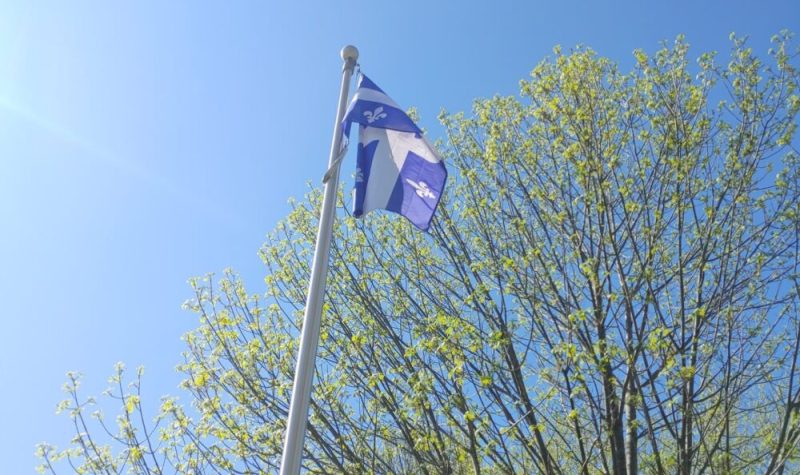Townshippers’ Association, an organization that supports and promotes the interests of English speakers in the Eastern Townships, is holding a demonstration at Massey-Vanier High School (MVHS), alongside some if its students and staff, on May 14 to address Bill 96.
Bill 96 is a language law Act that the Quebec government plans on implementing to promote and protect the French language through the introduction of various regulations such as capping English CEGEPS and limiting communication in English in government services. Impacting the rights and freedoms of both English speakers and French speakers in the province, there is a growing concern as to how the bill will affect the entire population.
“Townshippers’ Association worked with students from MVHS to provide the opportunity to educate the students and staff about Bill 96,” explained Nikki Moore, Network Partnership Initiative Agent for Townshippers.’ “We had a lot of interest in the topic and over 300 students and staff signed a very large petition that is going to be delivered to Isabelle Charest (Member of the National Assembly (MNA) for Brome-Missisquoi) on Saturday.”
Moore said that they are attempting to highlight the concerns of Bill 96 and that students have signed a total of 129 letters to send to their local MNAs.
“I believe, what I’ve heard, is that we will easily get 500 signatures by the time we need to deliver this (the petition),” she said.
In terms of the message Townshippers’ is trying to get out to the local community, Moore noted that it all comes down to a concern of the English language being “criminalized.”
“Particularly, I’ll speak to the concerns of the students who signed the petition and the staff as well. The main concern is that the English language would be criminalized. Quebec language officials will have more power than our judicial system because Bill 96 overrides the Quebec and Canadian Charter of Rights and Freedoms,” explained Moore.
Under Bill 96, English speakers will have to prove that they are a "historical Anglophone" if they want to communicate in their language or they can be fined.
“Once you’ve fined for speaking English to someone who does not have proof that they are a historical Anglophone, you have no legal recourse and you just have to pay up,” said Moore.
The Bill will give language officials the right to seize confidential documents, cellphones, laptops, etc., without any warrant if someone suspects that you are communicating in English.
“Anyone, any anonymous call, from anyone at all will give the language officials the right to seize you personal cell phone, confidential medical files, anything they want without a warrant. They can enter your place of work, hotel room, your home (if you work from home), your car, and they can take your devices, again, without a warrant,” explained Moore.
Fines can range between $700 to $90,000.
“All they need is one anonymous complaint from someone who expects you might be communicating in English, in the future, it doesn’t even have to have happened already, then the powers that the language officials have is enormous. The confidential reporting will be encouraged; so increase in surveillance and a decrease in privacy,” mentioned Moore.
Bill 96 will limit access to health and social services in English and any complaint can lead to a seizure of confidential medical files.
“Essentially, if you’re speaking to a service user in English, what you’re going to have to do is make sure that they have the proper documentation to prove they are an historical Anglophone. (…) Even then, how do you prove it? Will it be paperwork? Do we have to carry these papers around? Will it be a waterproof bracelet?” added Moore. “How to we prove this status that people are allowed to speak to us in English?”
Restrictions will also be place on English CEGEPS by placing a cap on the number of students allowed to attend.
“There will be no growth in terms of providing more spots available to our youth who want to access these programs. What that would do, and that’s why students from Val des Cerfs (the French school board that shares MVHS with the English Eastern Townships School Board) came to sign the petition, is because the priority of the spots will go to English speaking Anglophones with that historical documentation and will not go to them,” explained Moore.
Moore said that businesses will be faced with a pile of paperwork to prove that their employer is bilingual and that everyone, in some way, will be negatively affected by Bill 96.
“They don’t have the time, the money or resources for this so we’re going to lose those businesses that are just hanging on by a thread from the pandemic. (…) We’re just going to lose our economy and our people,” said Moore.
Moore emphasized that even if Bill 96 is passed, Quebecers need to stay informed and step up.
“We tend to allow these things to happen without doing anything about it. I know we’re tired. I’m tired, but, as I said, come to Massey-Vanier, the arena parking lot, 10 a.m., in Cowansville, it will take five minutes to sign your name so that you can contribute to your own health and your own access to social services, to the most vulnerable, and just help this province thrive,” she said.
They area at MVHS is located at 340 Rue Mercier, Cowansville.
More information about Bill 96 can be accessed by going to the Quebec Community Group’s Network (QCGN) website and the Task Force website.
Listen to the interview below:


